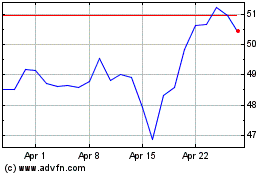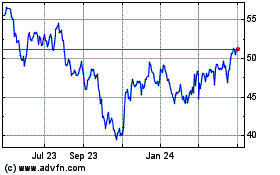Dominion Energy Turns to Cow Manure in Gas Pact -- Update
December 11 2019 - 7:50PM
Dow Jones News
By Ryan Dezember
Dominion Energy Inc. has struck a $200 million pact with a
renewable energy producer and the Dairy Farmers of America Inc. to
extract natural gas from cow manure.
The arrangement calls for the utility to fund construction of
organic-waste processing facilities called anaerobic digesters amid
clusters of large dairy farms, connect the facilities to natural
gas distribution pipelines and sell the gas. Vanguard Renewables,
of Wellesley, Mass., will build and operate the digesters, which
break down organic waste into usable fuel and fertilizer. Dairy
farmers, for a fee, will supply manure, and in some cases lease out
land upon which the equipment will be built.
It is the latest venture between big livestock concerns and
power producers aiming to generate pipeline-quality natural gas
from animal waste. Doing so results in gas that is more expensive
than that which has flooded the market from U.S. shale formations.
So-called biogas, however, is in high demand among consumers,
businesses and local governments eager to lower their emissions and
earn environmental plaudits. It can generate valuable and tradable
carbon offset credits for buyers, which can make producing biogas
worthwhile for companies like Dominion.
The utility, which serves 7.5 million customers in 18 states
with electricity or natural gas, in October enlarged to $500
million an existing deal to capture gas at Smithfield Foods Inc.
hog farms in five states. Last month, Perdue Farms Inc. and a
Maryland renewable energy company said they were building a
digester in Delaware to break down fat, sludge and offal from
poultry slaughterhouses into gas.
Twelve years ago, the cutting edge of utilities' efforts to
reduce emissions involved stretching tarps over manure lagoons to
trap the methane fumes so they could be funneled to a flare and
burned instead of just wafting to the clouds.
The advent of markets for carbon offset credits -- and the
urgency with which investors and governments are pushing companies
to reduce or counter their greenhouse-gas emissions -- has
increased the appeal of biogas. Demand is growing even though it
often costs many times more than gas produced by drillers, which is
about $2.25 per million British thermal units lately.
Methane, which cattle produce in abundance thanks to their
multichambered stomachs, is a particularly potent greenhouse gas.
The methane from the manure of a typical cow is roughly equivalent
to the annual emissions of a car that gets about 20 miles per
gallon and is driven 12,000 miles.
"It's an entire strategy on how we're approaching sustainability
and greenhouse-gas reductions," said Diane Leopold, co-chief
operating officer at Dominion. "We're looking to be a leader in
clean energy."
The anaerobic digesters are to be built over the next five years
around clusters of dairy farms in Georgia, Nevada, Colorado, New
Mexico and Utah. Each digester needs the manure of 20,000 to 30,000
cattle to be economical, said Ryan Childress, director of gas
business development at the utility. Dominion expects the
facilities to produce 1 billion cubic feet of gas annually. Though
just a sliver of total U.S. output, that is still enough to power
thousands of homes.
Vanguard Renewables has built five digesters in Massachusetts,
is building one in Vermont and is in the permitting stage for
another in New York. The gas has been sold to companies as well as
a city and a Vermont college. Kevin Chase, Vanguard's chief
investment officer, said the company found a receptive audience
among dairy farmers as it sought participants for the Dominion
venture.
"A lot of the dairies that we're talking to are going through
succession plans and the younger dairymen coming through are all
about being good stewards of the environment," Mr. Chase said.
"They're also looking at ways to diversify their balance
sheet."
Most digesters on dairies have been built and operated by
farmers, which had limited appeal among Dairy Farmers of America's
roughly 8,000 farm owners for the expense and operational
complexity involved, said David Darr, the cooperative's chief
strategy and sustainability officer. The prospect of having third
parties handle gas production and sales while earning fees for the
manure is more enticing, he said. Plus, the farmers get their
manure back once the methane is gone so that they can fertilize
with it.
"You still have access to those nutrients for cropping
operations," he said. "This is just to have an additional harvest,
to capture that methane that would otherwise just be emitted into
the environment."
Write to Ryan Dezember at ryan.dezember@wsj.com
(END) Dow Jones Newswires
December 11, 2019 19:35 ET (00:35 GMT)
Copyright (c) 2019 Dow Jones & Company, Inc.
Dominion Energy (NYSE:D)
Historical Stock Chart
From Mar 2024 to Apr 2024

Dominion Energy (NYSE:D)
Historical Stock Chart
From Apr 2023 to Apr 2024
